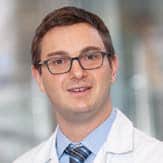Researcher Spotlight: Alexander Boardman, MD
Memorial Sloan Kettering
Dobosh Family Scholar

Treatment of lymphoma has been revolutionized by the emergence of CD19-directed chimeric antigen receptor (CAR) T-cell therapies, but many patients still relapse after treatment. Dr. Boardman’s LRF research seeks to validate a new target on the surface of lymphoma cells – CD24 – in the hopes of developing novel treatment strategies for these patients. Evidence suggests that, unlike CD19, CD24 may be necessary for tumor growth, making it less likely lymphoma cells will adapt to evade treatment. “Successful CD24-[directed] CAR T-cell designs may improve response rates and prevent relapses in lymphoma patients,” Dr. Boardman explains.
Dr. Boardman’s interest in oncology began early in life when his grandmother was diagnosed with metastatic breast cancer. “My desire to push oncology research forward is partially fueled by these memories,” he says. Dr. Boardman began his medical training at the University of Massachusetts Medical School in Worcester, MA, where he earned his medical degree. His passion for lymphoma was ignited during his internal medicine residency at Brigham and Women’s Hospital in Boston, where he was intrigued by the complexities of managing patients who relapsed after treatment. “At the time, CAR T-cell therapy was mainly investigational (not yet standard of care), and I had the great fortune of caring for patients after infusion,” he says. “These experiences drew me to the field and have fueled my passion for improving CAR T-cell therapy in the lab.”
Over the next 10 years, Dr. Boardman hopes to leverage his experiences engineering novel CAR T-cell therapies – and the mentorship he gains through the Lymphoma Scientific Research Mentoring Program – to develop a career as a translational medical oncologist leading early phase clinical trials of CAR T-cell therapies. “I believe we are well positioned as a field to greatly improve outcomes in lymphoma patients, but there is still plenty of work to be done,” he says.

